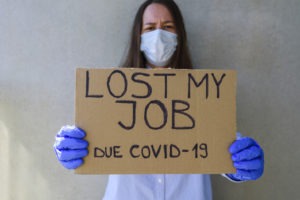
As a McKinney lawyer, I have been asked many questions about our Constitutional Rights during a pandemic, like COVID-19.
On March 13, 2020 Texas, Governor Abbott declared a statewide public health disaster as a result of the coronavirus outbreak. Following the disaster proclamation, Abbott issued a series of related directives. They include a statewide mask mandate and closure of nonessential businesses. Texans who failed to comply with the Governor’s orders could be fined and/or imprisoned.
Fast forward to May and a Texas hair salon owner, Shelley Luther, made national news. She was jailed for not complying with Abbott’s restrictions. She kept her hair salon open against the coronavirus safeguard directives.
The media attention brought numerous questions to the front of many Texans’ minds:
- Can Texas Governor Abbott issue an order requiring a lockdown and business closures?
- Did his actions violate Texas law?
- What are our constitutional rights in a situation like this?
As a McKinney lawyer focused on individual rights, I have spent a lot of time analyzing the Constitution. As a McKinney lawyer, I would like to answer each question and shed some light on when (and how) the government can restrict an individual’s rights.
Let’s start with a brief look at Texas law, then move on to the constitutional issues at play.
Does Governor Abbott’s Lockdown Order Violate Texas Law?
In short, Abbott’s disaster proclamation and related directives likely do not violate Texas law.
The Texas Disaster Act of 1975 governs the state’s emergency powers enable state officials to act quickly to mitigate “imminent threats.” The Act provides broad powers. They are primarily at the discretion of the governor, with legislative oversight when the legislature is in session. In practice, the directives and orders made in conjunction with a disaster are supposed to be narrowly tailored to respond to the nature of the emergency.
A McKinney lawyer might argue that a potential prison sentence for failure to comply with health mandates is not narrowly tailored to respond to a pandemic. After all, prisons are not the best environment for social distancing. They too have been hit hard by the coronavirus pandemic. Governor Abbott may have gone too far by including a potential prison sentence in his March 31st Executive Order.
When Shelley Luther’s arrest and jail sentence made news, Abbott quickly changed course. He amended his previous order to remove incarceration as a potential punishment. In doing so, Texas Governor Abbott likely fixed the main legal issue with his previous directives by tailoring the orders to only that which is necessary and reasonable.
With that brief look into the source of Governor Abbott’s powers under Texas law, let’s take a look at the bigger constitutional issues.
For a free legal consultation, call (972) 535-6377
What Constitutional Rights Apply During a Pandemic?
Before I dive into constitutional issues and relevant cases, it’s useful for me, as a McKinney lawyer, to provide a brief primer on the Constitution and Bill of Rights.
The Constitution is the supreme law of the land. It is comprised of seven original sections, called “Articles.” Articles 1-3 outline the separation of powers between the legislative, judicial, and executive branches of the federal government. Articles 4, 3 and 6 establish and delineate the relationship between the states and federal government. Finally, Article 7 established the process for the states to ratify the Constitution. It was ratified in 1788. It has been amended 27 times.
In the interest of brevity, I’ll stick to listing the first 10 Amendments – known as the Bill of Rights. The Bill of Rights contain the 10 most frequently referenced Amendments.
They are the:
1st Amendment – granting freedom of speech
2nd Amendment – granting the right to bear arms
3rd Amendment – prohibits quartering (no lodging of soldiers in private homes)
4th Amendment – prohibits unreasonable searches and seizures
5th Amendment – grants the right to remain silent
6th Amendment – grants the right to a jury and legal representation in a criminal case
7th Amendment – grants the right to a jury in a civil case
8th Amendment – prohibits excessive fines or bail
9th Amendment – promises other fundamental rights that haven’t been explicitly written
10th Amendment – powers not granted to federal government are reserved to the states
Can the Government Restrict Your Constitutional Rights?
Contrary to popular belief, most, if not all, of our individual rights are not absolute. They are subject to a balancing act with any countervailing state interest. For example, you have a constitutional right to freedom of speech. But, there are limits. You cannot yell, “FIRE!” in a crowded movie theatre without suffering consequences. There are often good reasons for these limits, like public safety.
It is up to the courts to determine if laws and government orders comply with the Constitution. The Supreme Court has answered a number of constitutional questions by reviewing state mandates to ensure they are adequately balanced with individual rights. Two cases, in particular, come to mind with respect to emergency powers and health mandates. They are: ex parte Milligan and Jacobson v. Massachusetts.
Let’s take a look at each case and how they apply to the issues we’re facing in 2020.
Ex Parte Milligan, 71 US 2 – Supreme Court 1866
The Milligan case arose out of the Civil War, when a prisoner was arrested, jailed, and later executed by the military commission. While in military prison, Milligan filed a petition for habeas corpus. It alleged the military commission did not have jurisdiction to try him.
Ultimately, the Supreme Court decided that Milligan’s rights were infringed, that he should have been released from custody and was unlawfully denied a trial by jury. They also found that the military commission lacked jurisdiction over Milligan.
What is important, and relevant, about this case is that the Court recognized that constitutional rights do not become less important or less enforceable simply due to critical circumstances. The Justices recognized that the Civil War was raging at the time of Milligan’s imprisonment and martial law was in effect. But, it said the Constitution applies equally in war as in peace.
Specifically, they found that it was unconstitutional for a civilian to be tried by a military commission unless there are no civilian courts available. Despite the exigent circumstances of the Civil War, civil courts were still available, so military courts should not have jurisdiction over civilians.
This case informs us that we still have rights, as Americans, even in emergency situations. But, it is an old case, and one that has been clarified by other cases.
Jacobson v. Massachusetts, 197 US 11 – Supreme Court 1905
This case hits close to home, as it arose out of Massachusetts when they were facing a smallpox pandemic in 1905. In an attempt to control the spread of the outbreak, Massachusetts passed a law allowing cities to require smallpox vaccinations for all residents. The city where Jacobson resided adopted an ordinance requiring the vaccination, and Jacobson was fined for refusing to comply with the order.
Like many people today, Jacobson argued that mandatory vaccination laws violated his individual rights. He felt the government should not be able to tell him what to do with respect to his own health.
The Jacobson court said that, while our constitutional rights cannot be suspended or eliminated, they are subject to reasonable regulation by the state. They went on to say that the state has the right to enact rules and regulations to prevent the spread of disease during a pandemic.
Essentially, the health and wellbeing of the public can overcome individual rights in certain cases. But restrictions on individual rights must be narrowly tailored to the nature of the emergency. Restrictions cannot be unreasonable or arbitrarily imposed.
Based on the ruling of the Jacobson Court, Texas Governor Abbott’s orders relating to coronavirus would prevail under constitutional scrutiny. Legally speaking, Abbott has acted within his powers as defined by Texas and United States law.
If Disaster Strikes You or Your Family, A McKinney Lawyer Can Help
At Underwood Law Office, we are McKinney lawyers that understand that these are especially trying times. We stand up for individuals who have been seriously hurt to ensure they are reimbursed for the harms and losses suffered. If you have any questions about your legal rights, please contact our McKinney lawyers for a free consultation.
Call or text (972) 535-6377 or complete a Free Case Evaluation form




